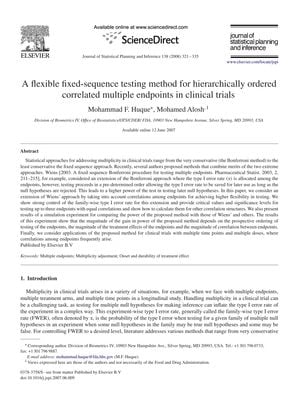A Flexible Fixed-Sequence Testing Method for Hierarchically Ordered Correlated Multiple Endpoints in Clinical Trials
June 2007
in “
Journal of Statistical Planning and Inference
”

TLDR The flexible fixed-sequence testing method allows for more effective evaluation of multiple goals in a clinical trial while controlling the risk of false positives.
The document describes a statistical method called the flexible fixed-sequence (FFS) testing method for use in clinical trials with multiple, hierarchically ordered endpoints that may be correlated. This method allows for the continuation of testing subsequent endpoints even if earlier ones are not significant, by leveraging the correlations between endpoints to mitigate the effects of multiplicity adjustments. The FFS method can increase the power of tests for certain endpoints by raising the significance level for a given hypothesis if preceding hypotheses are rejected. Although it may have slightly less power than the fixed-sequence (FS) approach when hypotheses are correctly ordered, it has the advantage of evaluating all clinically relevant endpoints and uses accumulated 'unused' alpha to enhance the power of later tests, especially when preceding endpoints are significant. The method is shown to maintain strong control of the family-wise type I error rate in clinical trials.

